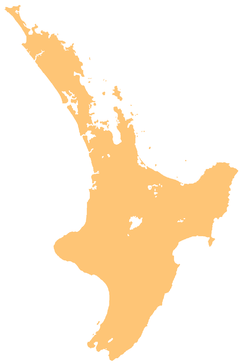Waipukurau
| Waipukurau | |
|---|---|
| Minor urban area | |
| Waipukurau's location within the North Island | |
| Coordinates: 39°59.5′S 176°33.5′E / 39.9917°S 176.5583°ECoordinates: 39°59.5′S 176°33.5′E / 39.9917°S 176.5583°E | |
| Country | New Zealand |
| Region | Hawke's Bay |
| Territorial authority | Central Hawke's Bay District |
| Population (June 2016) | |
| • Total | 4,080 |
| Postcode(s) | 4200 |
Waipukurau is the largest town in the Central Hawke's Bay District on the east coast of the North Island of New Zealand. It is located on the banks of the Tukituki River, 7 kilometres south of Waipawa and 50 kilometres southwest of Hastings.
Central Hawkes Bay, where the town is located was settled by Te Aitanga a Whatonga, the desecendants of Whatonga, grandson of Toi Kairakau. These were the Ngati Tara and Rangitāne peoples. In the mid 1500s the Ngāti Kahungunu invaded the area from the north and in the subsequent fighting drove the Rangitāne south into the Tahoraiti area (Dannevirke). Warfare continued through the 1600s until the time of Te Rangikoianake. His first child Te Kikiri was adopted by the Ngai Toroiwaho to be their chief - he had mana over the Waipukurau district.
Fighting broke out again in the 1800s at Mangatoetoe between Ngai Te Upokoiri and Ngāti Te Rangikoianake of Poukawa. Several of Te Rangikoianake's grand children were killed in this fight. Pareihe, a Ngati Rangikoianake Chief, avenged the defeat in a battle at Pukekaihau, Waipukurau after which a peace accord was made between the two tribes.
The accord was short lived with the death of Te Wanikau's brother-in-law (Chief of Ngai Te Upokoiri) prompting further conflict over the erection of rahui poles on Lake Poukawa, Ngati Rangikoianake's eel fishing area. The conflict, starting around 1819 and lasting till 1824 ended with the Ngati Rangikoianake and other local tribes evacuating the area and settling at Mahia. In the latter part of the 1820s Pareihe attacked the Ngai Te Upokoiri and regained the lands they had lost, with the Ngai Te Upokoiri taking refuge in the Manawatu. A peace accord was made between Pareihe and the Ngāti Tūwharetoa in the late 1830s. The Ngati Tuwharetoa had been allied with the Ngai Te Upokoiri.
...
Wikipedia

